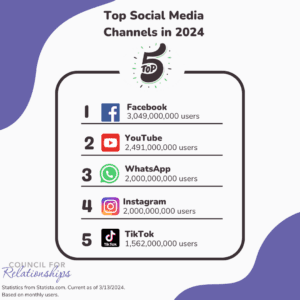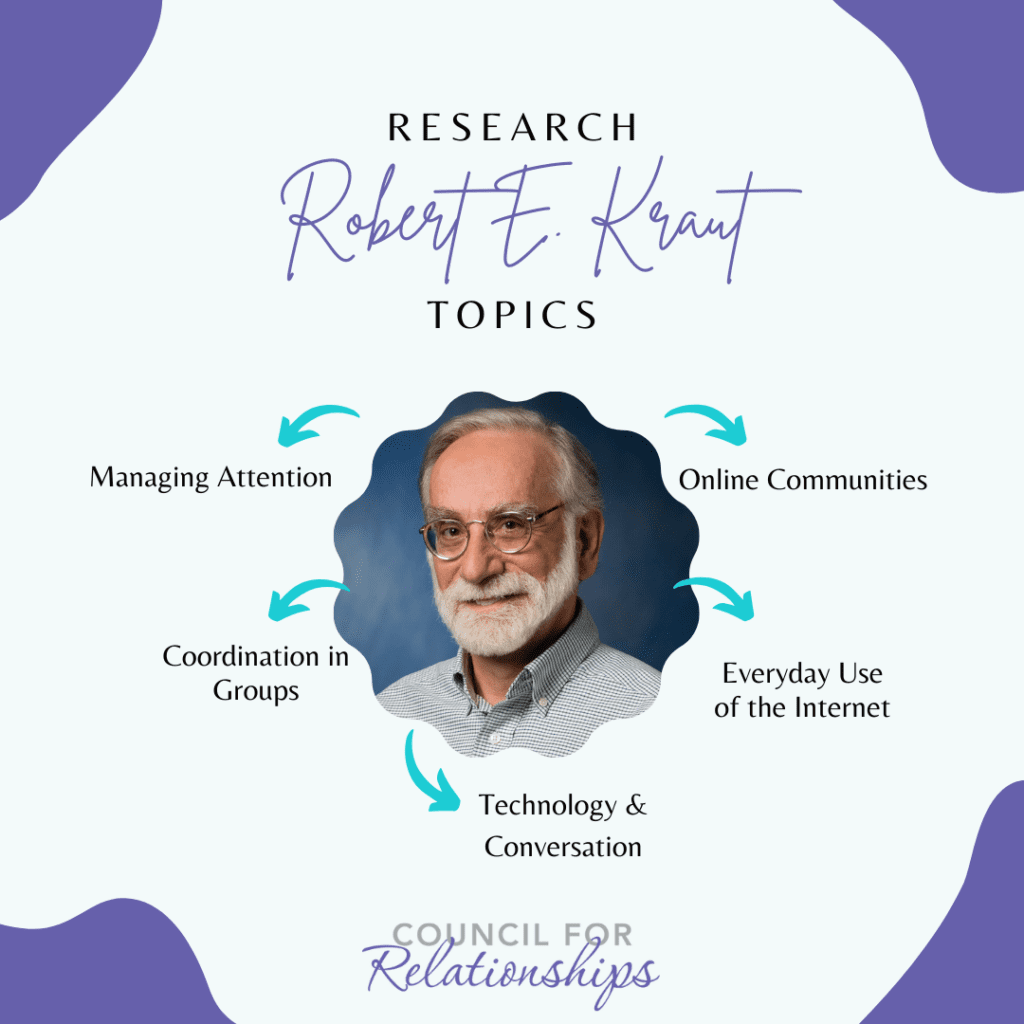Navigating Self-Care in the Age of Social Media
This blog delves into the evolution of social networks, the challenges and opportunities they present, and practical strategies for fostering self-care and compassion in our digital interactions. It aims to offer insights into maintaining a healthy equilibrium between our digital personas and real-life selves, emphasizing the significance of authentic connections. We invite you to continue reading to learn more about navigating self-care in the age of social media. We also invite you to share your own tips and insights with us on CFR’s Facebook, Instagram, and LinkedIn pages!
Introduction: Navigating Self-Care in the Age of Social Media
In today’s digital landscape, social media has dramatically reshaped the way we think about self-compassion and self-care.
With the rise of social media platforms like those under Meta Platforms Inc., which boasts billions of monthly active users across Instagram, WhatsApp, and Facebook, our ability to connect with vast online communities over shared interests has never been easier.
However, the research by figures such as Robert E. Kraut highlights the dual nature of these platforms, showing both the potential for positive social engagement and the risks to our mental health.
The Evolution of Social Platforms
Meta Platforms Inc.’s remarkable growth illustrates social media’s profound impact in the modern era. The transition from Facebook, the first social networking platform to exceed one billion registered accounts, to the dynamic realm of video-sharing platforms has transformed how we share and consume content.
The Rise of Meta Platforms Inc. and Billion Monthly Active Users
Statisa.com reports that Meta now operates four of the most popular social media platforms, each with a billion monthly active users, contributing to a user base that spans the globe. In the United States alone, there are 100 million Facebook users.
This massive engagement underscores the role of social networks in fostering online communities where real-time sharing of photos and videos creates vibrant, interactive spaces.
The Emergence of Video Content and Real-Time Sharing
Instagram Reels and platforms like TikTok have used video content to revolutionize how we connect, allowing users to instantly share their lives and passions. This shift towards video-sharing platforms has empowered communities, like those passionate about health and fitness, to rally around shared interests and experiences.
From a personal standpoint, Instagram Reels has, by and large, opened my eyes to the fact that many African American women are just as passionate about health and fitness as I am. Too often, we can feel like we are the exceptions for a lifestyle or particular interest when, in actuality, an entire community is just waiting to share their ideas and feedback…and they use video content and real-time sharing to do it.
For example, one of my first fitness heroes is former track and field athlete and personal trainer Ashley Joi. With her combination of weightlifting and psychology, Joi uses video content on Instagram to empower others to push past their physical and mental limits.
The Psychological Impact of Social Networks on Well-being
Robert E. Kraut’s research provides invaluable insights into the psychological effects of internet use, especially as we navigate the complexities of social interactions and mental health in the social media age.
Understanding Robert E. Kraut’s Research on Social Environments
While we plug away at our devices, potentially not noticing what changes are happening inwardly to us, inquiring minds like Social Psychologist Robert E. Kraut have been plugging away, studying the complexities of this phenomenon.
As early as the late 1990s, Kraut studied internet usage and its impacts on social relationships and participation in community life.
Kraut’s findings, significant even before the widespread adoption of social networks, indicate a link between increased internet activity and feelings of depression and loneliness, highlighting the importance of mindful engagement with social media platforms.
The Double-Edged Sword of Monthly Active Users and Shared Information
While social media offers an easy way to stay connected, its pervasive use among young people can lead to issues like reduced face-to-face communication and self-esteem problems, especially when individuals compare themselves to the seemingly perfect lives of others online.
Sometimes, we may not even realize we are starting to doubt or think down on ourselves until we have begun isolating or, even worse, really sinking into depressed feelings.
Practical Tips for Navigating the Social Media Landscape
The blurring of public and private lives online underscores the need for strategies that support a balanced approach to social media use and ensure it contributes positively to our social environment.
Balancing Public and Private: Choosing How to Look a Certain Way Online
Adopting healthy habits, such as engaging in offline activities that boost self-esteem, can help mitigate the pressure to always “look a certain way” online, fostering a more supportive and authentic space for self-expression.
Incorporating Healthy Habits: From Instant Messages to Real-Life Connections
Mindfulness in our digital interactions, from considering the intent behind our posts to choosing meaningful conversations over instant messages, is crucial. Engaging thoughtfully with user-generated content and supporting our online and offline communities can enhance our well-being and the well-being of others.
Here are a few tips to be mindful of when engaging in social media:
- When sharing your views or thoughts with others, ask yourself, “Am I being supported or ridiculed?” Your thoughts, feelings, and how you partake in self-expression matters! No one has the right to bully you.
- If you find yourself doing things you would not ordinarily do to fit in or look a certain way, take a step back and ask yourself if this desire comes from a place of negative self-talk.
- Not everyone deserves to hear your feelings or experience the privilege of your vulnerability, so share your thoughts with someone you trust and consider a source of support. Remember, social media is great, but you are even greater!
Conclusion: Embracing Self-Care in the Digital Age
The digital age, marked by the unprecedented growth of social media platforms, offers unique opportunities for connection and challenges to our mental health. Through the insights of researchers like Robert E. Kraut and the experiences shared within online communities, we see the importance of self-care and compassion in navigating the social media landscape.
For those seeking a balanced relationship with social media, guidance from mental health professionals like those at Council for Relationships can support adopting healthy digital habits. Connect with us to discover how we can help you maintain your well-being in this digital age and ensure that social media remains a positive aspect of your social environment.
 About the Author
About the Author
Bianca Williams, MFT, is a Staff Therapist at Council for Relationships.
Let’s validate that navigating self-care in the age of social media is tough. CFR Clinicians like Bianca are here to help! Contact her to book a therapy appointment with Bianca if you’re facing mental health challenges.
Bianca sees individuals, couples, and families in Philadelphia (in-person and online) and across Pennsylvania (online). She specializes in the following areas:
- Anger Management
- Communication
- Depression and Anxiety
- Grief, Loss, and Bereavement
- Life Transitions
- Men’s Issues
- Relationship Issues
- Self-Discovery/Self-Analysis
- Stress
- Trauma
- Women’s Issues
- Work/Life Balance
Tell your friends and family members to reach out to her for support.
Your mental (and physical) health is important to us. If you are looking for individual, couples, or family therapy or psychiatry services, see our Therapist & Psychiatrist Directory for CFR therapists or psychiatrists near you.
If this is an emergency, dial 9-1-1.
More from CFR
Did you enjoy this blog? Our expert therapists, psychologists, and psychiatrists offer much more to explore! Check out the CFR Expert Voices blog for great mental and emotional health advice and insight. To get first access to our Expert Voices blog, join our mailing list!


